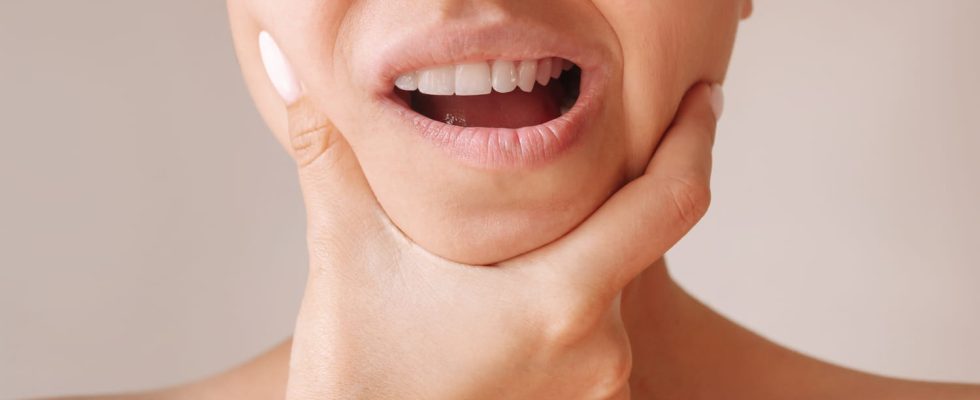A cracking jaw is a very common and very often benign phenomenon. The causes are multiple.
Cracking jaw or temporomandibular joint (TMJ) disorder is a sign of temporomandibular dysfunction (TMD). The causes are multiple.
Wisdom teeth
Jaw crunching can be caused by wisdom teeth. “Frequently, in people in their twenties who begin to feel crunches accompanied by pain, wisdom teeth are at the origin. They often grow in a bad position, which forces the jaw not to be straight in its opening and to tilt from right to left or vice versa. This phenomenon results in cracking and pain“, explains Dr Lotfi Benslama, stomatologist and maxillofacial surgeon and secretary general of the French Society of Stomatology.
A missing tooth
One of the other fairly common causes is missing teeth. “An adult who is remove a molar, in the event of decay or periodontal pocket for example, may have a cracking jaw if this tooth is not replaced, explains the dental surgeon. The patient finds himself with an offset in the mandible, with one side “higher” than the other. It’s a bit like the jaw is limping. After a certain number of months and years, muscle pain appears, because the muscles function in a non-physiological way.” Cracking of the jaw can also come from dental malposition: the upper teeth do not come into contact with the lower teeth correctly. This misalignment dental often causes problems in the temporomandibular joint.
Muscle fatigue
When the muscles have been overworked for a while, they tense up and become painful. We force the jaw to make a number of movements that exceed its physiological capabilities. We must find the causes of this muscular fatigue in order to remedy this TMJ disorder. Certain muscular diseases such as myositis, which are very rare, may be responsible.
Bone cancer?
“Bone and cartilage tumors are extremely rare, says Doctor Benslama. However, we need to make sure that everything is fine and that cancer is not the cause of the jaw cracking. This is why we may have to do a scan in function (mouth open) and at rest (mouth closed).”
What causes a cracking jaw in the morning?
A cracking jaw is often linked to the stress, and how we manage this stress. Stressful periods (a business creation, a family difficulty) can cause or exacerbate symptoms. “The jaw muscles work almost as much during the day as at night, confesses the secretary general of the French Society of Stomatology. Episodes of stress then cause very significant nocturnal muscle contractions.”
What causes a cracking jaw while eating?
The jaw certainly moves when eating meals, but ultimately, The cause of jaw cracking is not related to eating. The cracking is linked to another cause that it is essential to find.
Jaw cracking in the ear: a sign of what?
“The temporomandibular disc is very close to the ear. When pain accompanies the cracking jaw, the patient often feels like they have ear pain. This is why most time, he turns to an ENT doctor. Fortunately, ENT doctors are knowledgeable health professionals; therefore, they refer the patient to a stomatologist.”
Is it serious and when to worry?
The cracking jaw is not a symptom of severity. However, it requires support. Repetitive pain and cracking are unpleasant and can also lead to other more disabling symptoms due to disc damage or very severe muscle contracture:
- A blocked jaw
- Decreased jaw mobility
- Headaches (headaches)
- Pain in the ear, which can be severe
- Sometimes a feeling of dizziness.
Who to consult? A stomatologist?
When the jaw cracks, you should consult a stomatologist or maxilofacial surgeon. “This direct access consultation is possiblespecifies Dr. Benslama. If the patient is very stressed or going through a difficult period, they can go to their doctor. The latter can prescribe muscle relaxants to relieve symptoms“.
What solutions to treat a cracking jaw?
There are several solutions to treat a cracked jaw, and the treatment of course depends on its origin.
► Removal of wisdom teeth when these teeth grow
► Orthodontic treatment when the teeth are not aligned.
► Replacing the missing tooth and reestablishing an occlusal plate, that is to say a correct surface between the upper teeth and the lower teeth, limits jaw crunching.
► Physiotherapy is a therapy that can be offered. “However, only physiotherapists trained in jaw joint physiotherapy have the required skills. Qualified professionals who have completed the additional modules are referenced on a list held by stomatologists..”
► Interposition gutters between the upper and lower jaw can reduce the symptoms of jaw cracking. “These aligners, which are similar to mouthguards for athletes, correct the bad positioning and fill in the absence of teeth during the night. Thus, the relief is very appreciable, and this for several months.
► A prescription for appropriate medications and muscle relaxants in cases of stress. Natural techniques to better manage daily stress, such as sport, sophrology or yoga.
An operation in very specific cases
“Cracking of the jaw does not warrant surgery. The indications for surgery are specific, in the event of bone or disc abnormalities. For example“, specifies the stomatologist surgeon. The cracking jaw is not very serious, but it justifies a diagnostic approach to find the causes. The maxillofacial surgeon will recommend rapid-effect therapy, such as physiotherapy, extraction of wisdom teeth or taking muscle relaxers, then therapy to treat the problem in the long term.
Thanks to Dr L. BENSLAMA, stomatologist and maxillofacial surgeon practicing in Paris, Secretary General of the French Society of Stomatology, Maxillofacial Surgery and Oral Surgery.
